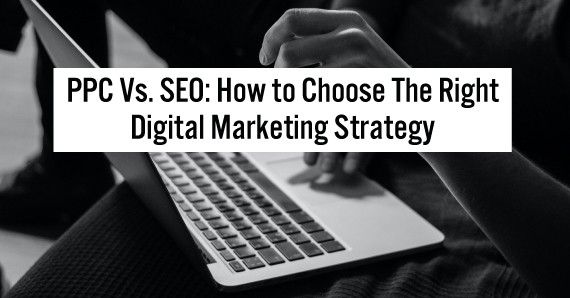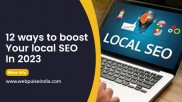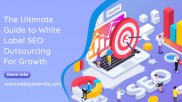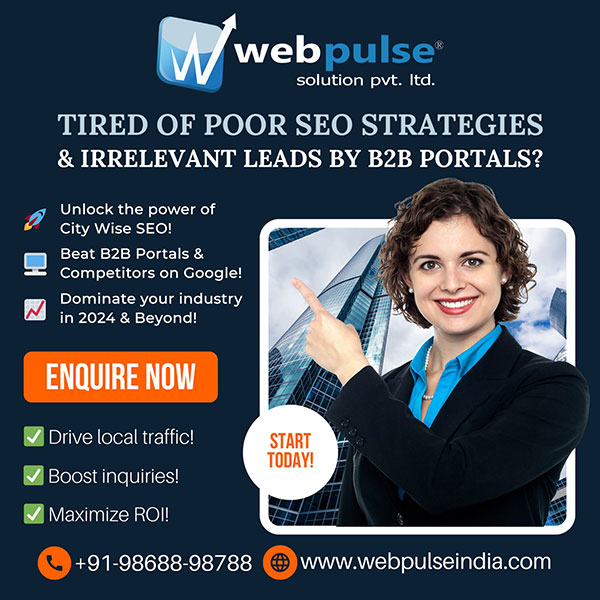In the ever-evolving world of digital marketing, businesses often find themselves at a crossroads when deciding between two powerful strategies: Pay-Per-Click (PPC) and Search Engine Optimization (SEO). Both methods aim to increase online visibility, drive traffic, and boost conversions, but they take different approaches. To make an informed choice, it's essential to understand the differences and strengths of PPC and SEO and how they can align with your business goals. Webpulse Solution Pvt. Ltd. is one of the best Digital Marketing Agency in Delhi.
PPC (Pay-Per-Click) Marketing
PPC marketing is a paid advertising strategy where businesses bid on keywords to display their ads at the top of search engine results pages (SERPs). Every time a user clicks on their ad, the business incurs a cost. Google Ads and Bing Ads are popular platforms for PPC advertising used by the top Digital Marketing Agency in India.
Advantages of PPC
- Immediate Results: One of the most significant advantages of PPC is its ability to deliver quick results. As soon as your campaign is set up and running, your ads can appear on the first page of search results, driving instant traffic to your website.
- Budget Control: With PPC, you have full control over your budget. You can set daily or monthly spending limits, ensuring you stay within your financial constraints.
- Measurable Results: PPC campaigns provide detailed metrics, allowing you to track clicks, impressions, conversions, and ROI accurately. This data helps in optimizing campaigns for better performance.
SEO (Search Engine Optimization)
According to the top Digital Marketing Company in India, SEO, on the other hand, is an organic, non-paid approach to improving your website's visibility on search engines. It involves optimizing various aspects of your website, such as content, meta tags, and backlinks, to rank higher in SERPs.
Advantages of SEO
- Long-Term Sustainability: While SEO takes time to yield results, the efforts you put into optimizing your website can lead to sustainable, organic traffic in the long run.
- Cost-Effective: Unlike PPC, SEO does not require a direct financial investment for each click. Over time, this can lead to a more cost-effective solution for businesses looking to maintain a strong online presence.
- Trust and Credibility: Websites that rank high in organic search results are often perceived as more trustworthy and credible by users. Your company's reputation and public perception may improve as a result.
- Broad Visibility: SEO doesn't limit the number of clicks or impressions you receive based on your budget. Your website can receive a constant stream of organic traffic without the need for continuous ad spend.
- Enhanced User Experience: SEO practices often lead to improvements in website usability and user experience, which can indirectly contribute to higher conversions.
Also, Check: SEO Vs Paid Marketing: Difference, Pros & Cons, and An Integrated Approach
Choosing the Right Strategy
The decision between PPC and SEO depends on various factors, including your business goals, budget, timeline, and competition. A good Digital Marketing Company in Delhi will guide you in preparing the perfect strategy for your website.
- Immediate Results vs. Long-Term Gains: If you need quick results and have the budget for it, PPC might be the way to go. However, if you're looking for sustainable, long-term growth, SEO should be your primary focus.
- Budget Constraints: Consider your budget carefully. If you have limited resources, SEO may be a more cost-effective choice in the long run. PPC can quickly eat into your budget, especially in competitive industries.
- Keyword Competition: Analyze the competitiveness of your industry and target keywords. If your niche has highly competitive keywords, PPC might be necessary to gain initial visibility.
- Audience and Goals: Understand your target audience and their preferences. PPC allows for precise audience targeting, while SEO helps build a broader online presence.
- Testing and Optimization: If you value the ability to constantly test and optimize your campaigns, PPC offers more flexibility in this regard.
- Complementary Strategies: It's important to note that PPC and SEO are not mutually exclusive. In fact, they can complement each other. In the opinion of the best Digital Marketing Agency, running both PPC and SEO campaigns simultaneously can maximize your online visibility and capture different segments of your target audience.
Conclusion
The choice between PPC and SEO depends on your specific business needs and goals. While PPC offers immediate results and precise targeting, SEO provides sustainable, long-term growth and credibility. The ideal strategy may involve a combination of both methods, tailored to your budget and objectives. A well-informed decision will lead to a successful digital marketing campaign that drives traffic, engages users, and converts leads into customers.



 We are Hiring
We are Hiring

























